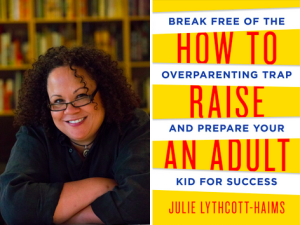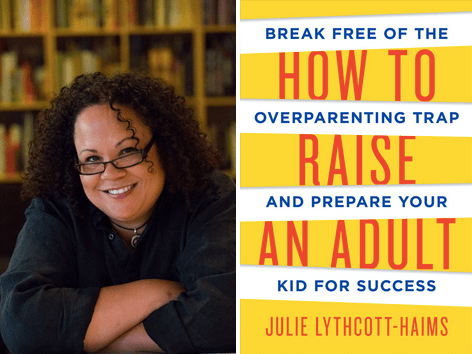A carefully curated schedule from a young age featuring the right tutors, classes and extracurriculars may get you into your school of choice. But what happens once you get there?
Former Dean of Freshmen Julie Lythcott-Haims ’89 wrote “How to Raise an Adult” to warn against “helicopter parenting,” or, as she put in her book trailer, “holding… hands too much, too hard, too often.” Lythcott-Haims uses her 10 years at the University and her personal experience as a parent to detail the risks of children’s overdependence on their parents. The Daily sat down with Lythcott-Haims to discuss her opinions on helicopter parenting.

The Stanford Daily (TSD): Back in 2012, you warned against the “padded cell of childhood” in a Ted Talk. How long has this issue been on your mind?
Julie Lythcott-Haims (JL): It’s been on my mind for 10 years. I was just a college dean with more and more parents wanting to be involved in the day-to-day lives of their adult sons and daughters. I saw those same sons and daughters really lacking the wherewithal to make their own decisions, deal with the transactional aspects of life at the University, solving problems, handling disputes. I thought, ‘What will become of us all in a society led by this generation someday’?
In the last three or four years, folks in the psychology community have come out with study after study after study linking an over-parenting style with greater rates of anxiety and depression. In the beginning, it was just me, this dean with some hunches and compassion for young people, and now there are these mental health consequences.
TSD: As Dean of Freshmen, how did you try to combat this issue and emphasize independence?
JL: When I was in the presence of one of my students and their parents, I would always direct my eye contact to the student. Even if the parent asked the question, I would direct my eye contact to the son or daughter, and it was my way of saying very subtly that the person who should be retaining this information is this college student.
I also sent very overt messages to parents when I had the opportunity to speak with them. I was very clear in my conversations with parents that [their] son or daughter isn’t a child anymore. I was always encouraging, in a very compassionate way, that it’s time. Trust your son or daughter. Trust the University. Now it’s time to let your kid be the driver.
TSD: You spoke with KQED about how children are taught to fear strangers so much so that they are unable to meet new people. What other ways does helicopter parenting overcorrect or backfire?
JL: Students whose parents are forcing them to study a particular thing — two students come to mind. These women were really smart, really accomplished, really trying hard, but just withering, walking some path that someone else was making. I had no doubt that their parents were certain that they were doing the right thing.
What I learned from working with thousands of college students over the years is that success in life comes from figuring out what you’re good at and what you love and having the courage to find a career in furtherance of those interests. Your own intrinsic motivation in these subjects is what carries you through the hardest parts of it.
TSD: In your experience, does helicopter parenting stem from being overprotected themselves as children or from being given less attention?
JL: When the Baby Boom began over parenting in the 1980s, it became the way parenting happened in the United States. The Baby Boom, their parents were certainly more hands off than the Baby Boom became, but I don’t think people would call the way they were raised neglectful. In the early ’80s, we had this confluence of teaching to the test, praising kids for every little thing, organizing play and not letting them be alone in the world. Parents were super involved in their kids’ lives. We shouldn’t have been surprised then, when we saw parents coming to college with their kids in 1998 or so and wanting to play a very close role in the life of their kids.
I think the greatest irony is that the Baby Boom were such great champions of their own right to be heard. Their mantra was ‘question authority.’ They demanded a seat at the table, they demanded a right to be heard. This was the first generation where teenagers had a voice, and ironically by doing so much of the thinking for their own kids, they’ve actually deprived their kids of developing that same tough, rugged spirit that the Baby Boom had.
TSD: What would you say to parents who feel that they must “hover” in order to give their children the same advantages that their peers have?
JL: Parents have lost sight of the long-term goal. Our long-term goal, as parents, should be to put ourselves out of a job and raise our kids to self actualize independence. [Students] are going to be left in the dust because their peers who have not been over parented will actually have the skills to make their way through the day with the confidence that comes from being allowed to do for themselves.
TSD: You reference Malcolm Gladwell and his theory that students shouldn’t go to the best college they get into. Who should be going to top-tier schools like Stanford if they can excel more in less selective schools?
JL: Malcolm Gladwell’s theory is that you should be the big fish in a small pond. You should go to one of the highly selective schools if you feel you are really excited and prepared to fully engage everything that the school has to offer: the classes, the research. [Attend those schools] if you have the confidence based on your own high school habits and your interests and can really thrive there. You don’t want to go where you feel, ‘I’m going to be in the bottom half of the class.’ Obviously by definition, half the class is going to be the bottom, but Gladwell writes about the psychological harm that can come and how people end up not pursuing their dreams. You want to be challenged, but not overwhelmed and [feeling] that you’re in the back of the class.
This interview has been condensed and edited.
Contact Alina Abidi at alinafabidi ‘at’ gmail.com.
